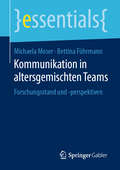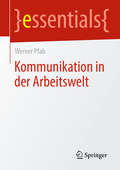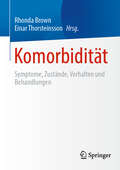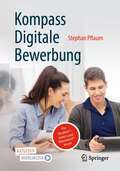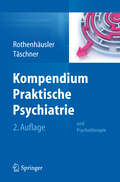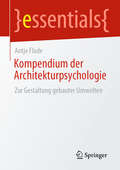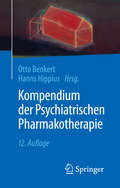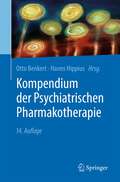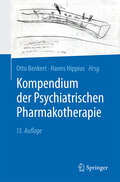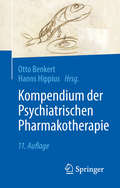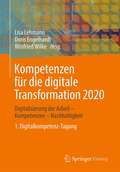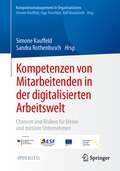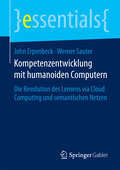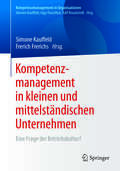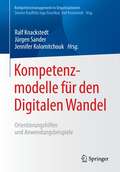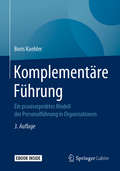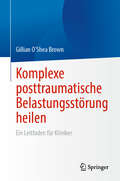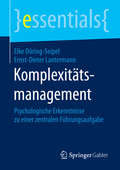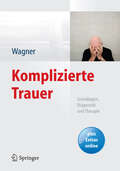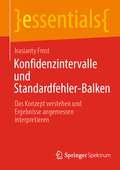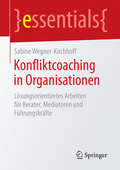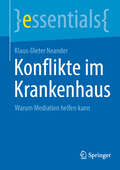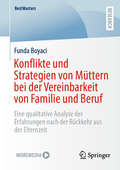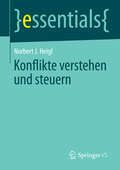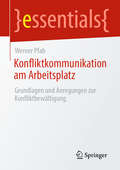- Table View
- List View
Kommunikation in altersgemischten Teams: Forschungsstand und -perspektiven (essentials)
by Michaela Moser Bettina FührmannDieses essential beschreibt den Einfluss einer altersgemischten Gruppenzusammensetzung auf die Kommunikation im Teamkontext. Unterschiedliche Denk- und Arbeitsweisen sowie gegenseitige Altersstereotype bergen Kommunikationsprobleme, die eine erfolgreiche Teamarbeit behindern. Zur Vermeidung dieser Effekte und zur Nutzung des Innovationspotenzials altersheterogener Teams ist ein tieferes Verständnis der kommunikativen Prozesse und Dynamiken in altersgemischten Teams erforderlich.
Kommunikation in der Arbeitswelt (essentials)
by Werner PfabIn diesem Essential werden wesentliche arbeitsbezogene Aspekte zwischenmenschlicher Kommunikation erläutert, u.a. die Einbindung in die jeweilige Arbeitskultur, das Moment wechselseitiger Abhängigkeit, der Inszenierungs-, Macht- und paradoxe Charakter. Ferner wird die Wirkungsweise wichtiger Gesprächsformate (u.a. Arbeitsbesprechung, Kundengespräch) erklärt und es werden Anregungen für eine angemessene Kommunikationspraxis gegeben.
Komorbidität: Symptome, Zustände, Verhalten und Behandlungen
by Einar Thorsteinsson Rhonda BrownDieses Buch stellt eine neue Theorie über die erhebliche Komorbidität vor, die zwischen vielen Krankheiten und Störungen und gleichzeitigen Symptomen wie Schmerzen, Schlafstörungen und Müdigkeit besteht. Zu den besprochenen Krankheiten und Störungen gehören Adipositas, Diabetes mellitus Typ II, medizinische Erkrankungen wie Herz-Kreislauf-Erkrankungen und Schlafstörungen, Essstörungen sowie affektive Störungen (Angst und Depression). Das Buch geht davon aus, dass die Komorbiditäten das Ergebnis eines komplexen bio-psycho-behavioralen Mechanismus sind, der eine Störung des zirkadianen Rhythmus einschließt. Es untersucht methodische (z. B. Mess-) Probleme, die das Verständnis der Komorbidität erschweren können, und erforscht ein breites Spektrum neuer, bestehender und neu entwickelter Therapieansätze, die bei der Behandlung komorbider Störungen von Nutzen sein könnten.
Kompass Digitale Bewerbung: Für Student*innen und Absolvent*innen
by Stephan PflaumDieses Arbeitsbuch für Studierende und Absolventinnen aller Fachbereiche führt Sie wie ein Kompass durch den Bewerbungsprozess vom Praktikum bis zum ersten Job nach dem Studium. Zahlreiche Checklisten zum Ausfüllen und Reflektieren erleichtern Ihnen den Prozess.In den letzten beiden Jahren hat sich viel verändert. So schwer die Pandemie die Gesellschaft in allen Teilen getroffen hat, so sehr hat sie auch die Prozesse der Digitalisierung in allen Lebensbereichen weitergetrieben. Auch in Bewerbungsverfahren hat sich vieles geändert. Während die blaue papierlederne Bewerbungsmappe mit goldenen Lettern schon länger der Vergangenheit angehört, hat sich nun auch der übrige Bewerbungsprozess weiter digitalisiert: vom Video-Interview bis hin zur remote Einarbeitung.
Kompendium Praktische Psychiatrie
by Karl-Ludwig Täschner Hans-Bernd RothenhäuslerDas Fachbuch für Studium und Praxis bietet eine übersichtliche Einführung in Psychiatrie und Psychotherapie. Dargestellt werden das Arbeitsfeld der Psychiatrie, die psychopathologische Befunderhebung, diagnostische und therapeutische Prinzipien sowie die psychiatrischen Krankheitsbilder. Die Autoren betrachten auch spezielle Aspekte: Notfall-, Kinder- und Jugend- sowie Konsiliarpsychiatrie. Für die 2. Auflage wurden alle Inhalte aktualisiert und um typische Fallgeschichten erweitert. Außerdem neu: umfangreicher Anhang, u. a. mit 100 Prüfungsfragen.
Kompendium der Architekturpsychologie: Zur Gestaltung gebauter Umwelten (essentials)
by Antje FladeDieses essential liefert planungsrelevante Informationen über architekturpsychologische Konzepte und empirische Ergebnisse zu den Wirkungsweisen gebauter Umwelten auf den Menschen und liefert Hinweise, wie die Beziehungen zwischen Mensch und gebauter Umwelt optimiert werden können.
Kompendium der Psychiatrischen Pharmakotherapie
by Otto Benkert Hanns HippiusSeit Jahrzehnten der unangefochtene Bestseller für die Psychopharmakotherapie!Seit nunmehr 12 Auflagen steht das Buch für Verlässlichkeit und Kompetenz.In der Neuauflage wurden sämtliche Inhalte sorgfältig überarbeitet und auf den neuesten Stand gebracht. Selbstverständlich finden Sie alle neuen Präparate mit den aktuellsten Empfehlungen und Bewertungen und die Berücksichtigung der DSM-5 Klassifikation.Das „Kompendium der psychiatrischen Pharmakotherapie“ ist der unverzichtbare Leitfaden für die Psychiatrie. Nirgendwo sonst findet man so komprimiert alles Wissenswerte rund um die Psychopharmakotherapie PLUS alles Wesentliche zu den einzelnen psychischen Störungen.Begleitend zum Buch gibt es einen kostenfreien Psychopharmaka-Blog (Kompendium News), der Sie über Neuerungen auf dem Laufenden hält, und den „Pocket Guide Psychopharmaka“, die ganz kleine und schnelle Variante für die Kitteltasche.
Kompendium der Psychiatrischen Pharmakotherapie
by Otto Benkert Hanns HippiusSeit Jahrzehnten der unangefochtene Bestseller für die Psychopharmakotherapie!Verlässlichkeit und Kompetenz zeichnet auch die 14. Auflage des Kompendiums aus. In der Neuauflage wurden sämtliche Inhalte sorgfältig überarbeitet und auf den neuesten Stand gebracht. Selbstverständlich finden Sie alle neuen Präparate mit den aktuellsten Empfehlungen und Bewertungen und die Berücksichtigung der DSM-5 Klassifikation.Das „Kompendium der psychiatrischen Pharmakotherapie“ ist der unverzichtbare Leitfaden für die Psychiatrie. Nirgendwo sonst findet man so komprimiert alles Wissenswerte rund um die Psychopharmakotherapie PLUS alles Wesentliche zu den einzelnen psychischen Störungen.
Kompendium der Psychiatrischen Pharmakotherapie
by Otto Benkert Hanns HippiusSeit Jahrzehnten der unangefochtene Bestseller für die Psychopharmakotherapie!Mit der inzwischen 13. Auflage steht das Buch einmal mehr für Verlässlichkeit und Kompetenz. In der Neuauflage wurden sämtliche Inhalte sorgfältig überarbeitet und auf den neuesten Stand gebracht. Selbstverständlich finden Sie alle neuen Präparate mit den aktuellsten Empfehlungen und Bewertungen und die Berücksichtigung der DSM-5 Klassifikation.Das „Kompendium der psychiatrischen Pharmakotherapie“ ist der unverzichtbare Leitfaden für die Psychiatrie. Nirgendwo sonst findet man so komprimiert alles Wissenswerte rund um die Psychopharmakotherapie PLUS alles Wesentliche zu den einzelnen psychischen Störungen.Begleitend zum Buch gibt es einen kostenfreien Psychopharmaka-Blog (Kompendium News), der Sie über Neuerungen auf dem Laufenden hält. Jetzt erstmals in einem neuen Buchformat und mit angepasstem, modernem Layout.
Kompendium der Psychiatrischen Pharmakotherapie
by Otto Benkert and Hanns HippiusSeit Jahrzehnten der unangefochtene Bestseller für die Psychopharmakotherapie!Seit nunmehr 11 Auflagen steht das Buch für Verlässlichkeit und Kompetenz.In der Neuauflage wurden sämtliche Inhalte sorgfältig überarbeitet und auf den neuesten Stand gebracht. Selbstverständlich finden Sie alle neuen Präparate mit den aktuellsten Empfehlungen und Bewertungen.Das „Kompendium der psychiatrischen Pharmakotherapie“ ist der unverzichtbare Leitfaden für die Psychiatrie. Nirgendwo sonst findet man so komprimiert alles Wissenswerte rund um die Psychopharmakotherapie PLUS alles Wesentliche zu den einzelnen psychischen Störungen.Begleitend zum Buch gibt es einen kostenfreien Psychopharmaka-Blog (Kompendium News), der Sie über Neuerungen auf dem Laufenden hält, und den „Pocket Guide Psychopharmaka“, die ganz kleine und schnelle Variante für die Kitteltasche.
Kompetenzen für die digitale Transformation 2020: Digitalisierung der Arbeit - Kompetenzen - Nachhaltigkeit 1. Digitalkompetenz-Tagung
by Lisa Lehmann Doris Engelhardt Winfried WilkeIn Wirtschaft und Gesellschaft schreitet die digitale Transformation immer schneller voran, somit wird es immer bedeutender, den Menschen und Organisationen die notwendigen neuen Kompetenzen zu vermitteln. In diesem Zusammenhang muss der Fokus auf die berufliche und akademische Ausbildung von Berufsanfängern sowie auf die Weiterbildung von Mitarbeitenden gerichtet sein. Nur so werden wir den Wirtschaftsstandort Deutschland nachhaltig sichern. Diese Herausforderung können wir als Akteurinnen und Akteure der digitalen Transformation nur gemeinsam annehmen und gemeinsam lösen. Mit dieser Tagung wird eine Plattform geschaffen, bei der sich alle Prozessbeteiligten austauschen können. Profitieren Sie von den Erfahrungen eines interdisziplinären Plenums aus Wissenschaft, Wirtschaft, Bildung, Verwaltung und Politik.
Kompetenzen von Mitarbeitenden in der digitalisierten Arbeitswelt: Chancen und Risiken für kleine und mittlere Unternehmen (Kompetenzmanagement in Organisationen)
by Simone Kauffeld Sandra RothenbuschDieses Fachbuch betrachtet aus einer anwendungsorientierten Perspektive aktuelle und zukünftig nötigte Kompetenzen von Mitarbeitenden im Hinblick auf die fortschreitend digitalisierte Arbeitswelt. Es bietet ausgewählte wissenschaftlich fundierte und praxisnahe Einblicke in das Kompetenzmanagement von kleinen und mittleren Unternehmen, indem es Kompetenzmodelle sowie Unterstützungsmaßnahmen des formalen und informellen Lernens v. a. mittels digitaler Möglichkeiten präsentiert und diskutiert. Die anschaulich beschriebenen Anwendungsbeispiele zeigen innovative Maßnahmen auf, die bedeutsame Impulse für die eigene Praxis bieten können.Dies ist ein Open-Access-Buch.
Kompetenzentwicklung mit humanoiden Computern: Die Revolution des Lernens via Cloud Computing und semantischen Netzen (essentials)
by John Erpenbeck Werner SauterJohn Erpenbeck und Werner Sauter analysieren die zukünftigen Entwicklungen im Bereich des betrieblichen Lernens und leiten daraus die Anforderungen an die aktuellen Lernkonzeptionen ab. Das Essential enthält praxiserprobte Anwendungsvorschläge für die Kompetenzentwicklung mit innovativen Lernformen. Lernräume und Lernkulturen in Unternehmen müssen sich schrittweise im Hinblick auf die kommenden Veränderungen entwickeln, humanoide Computer werden die Rolle des ,,Lernpartners Computer" übernehmen. Kompetenz - die Fähigkeit, Problemstellungen im Prozess der Arbeit selbstorganisiert und kreativ zu lösen - wird zum wichtigsten Lernziel.
Kompetenzmanagement in kleinen und mittelständischen Unternehmen
by Frerich Frerichs Simone KauffeldDieses Buch vermittelt fundiert und praxisnah, wie kleine und mittlere Unternehmen Ansätze für ein betriebliches Kompetenzmanagement implementieren können, welche die in den Betrieben existierende Betriebskultur mit einbeziehen. Vorgestellt wird ein breites Spektrum an Konzepten und konkreten Handlungsansätzen anhand von Fallbeispielen aus diversen Branchen – von der Sozial- und Landwirtschaft über Pflegeeinrichtungen bis zu Handwerksbetrieben. Ausgehend von der jeweiligen Betriebskultur werden Vorgehensweisen und spezielle neue Ansätze, die den branchenspezifischen Besonderheiten Rechnung tragen, sowie zentrale Akteure für die Lösungsentwicklung (Beschäftigte, Führungskräfte, Berater-/innen) aufgezeigt.
Kompetenzmodelle für den Digitalen Wandel: Orientierungshilfen und Anwendungsbeispiele (Kompetenzmanagement in Organisationen)
by Jürgen Sander Ralf Knackstedt Jennifer KolomitchoukDas Fachbuch bietet Orientierungshilfe bei der Analyse der Kompetenzanforderungen im Digitalen Wandel. Es stellt Kompetenzmodelle unterschiedlicher Ausrichtungen vor und dient als Ausgangsbasis für die Profilbildung in der eigenen Organisation. Schwerpunkte sind Computational Thinking, Informationskompetenz, Künstliche Intelligenz und ethische Reflexion. Die Anforderungen dienen als Basis für die Konzeption einer passgenauen Kompetenzentwicklung für den Digitalen Wandel. Anschaulich präsentierte Anwendungsbeispiele regen die Umsetzung innovativer Maßnahmen im Umfeld der eigenen Organisation an.
Komplementäre Führung: Ein praxiserprobtes Modell der Personalführung in Organisationen
by Boris KaehlerErfahren Sie in diesem Buch über Führungskräfteentwicklung alles über das Modell der Komplementären FührungIn diesem Fachbuch stellt Professor Boris Kaehler neben relevanten führungstheoretischen Grundlagen sein in der Praxis erprobtes Modell der Komplementären Führung vor. Dieses behandelt im Kern folgende Themen:Aufgabenmodelle der FührungFühren als DienstleistungShared-Leadership-Ansatz Mit seinem Werk möchte Kaehler Unternehmen dabei unterstützen, entsprechende Modelle zu entwickeln und einzuführen. Hierfür umfasst das Buch über die Führungskräfteentwicklung detaillierte Beschreibungen und praktische Projektempfehlungen. Ein optimales Nachschlagewerk für Führungskräfte und Fachleute aus dem Bereich HR Kaehlers Buch „Komplementäre Führung“ richtet sich an alle, die sich für Führungstheorien interessieren. Fachleute aus dem Human Resources Management sowie Führungskräfte, die das Führen in Organisationen gestalten und nach überzeugenden theoretischen Grundlagen für ihre Arbeit suchen, profitieren von diesem umfangreichen Arbeitsbuch und Nachschlagewerk.
Komplexe posttraumatische Belastungsstörung heilen: Ein Leitfaden für Kliniker
by Gillian O’Shea BrownDieses Buch ist ein Leitfaden für Kliniker zum Verständnis, zur Diagnose, Behandlung und Heilung der komplexen posttraumatischen Belastungsstörung (C-PTSD). Die komplexe posttraumatische Belastungsstörung (C-PTSD), eine diagnostische Entität, die 2022 in die ICD-11 aufgenommen werden soll, bezeichnet eine schwere Form der posttraumatischen Belastungsstörung (PTBS) und ist das Ergebnis eines lang anhaltenden und wiederholten zwischenmenschlichen Traumas. Der Autor bietet eine Anleitung zur Heilung komplexer Traumata durch phasenorientierte, multimodale und kompetenzorientierte Behandlungsansätze, wobei der Schwerpunkt auf der Linderung von Symptomen und der Verbesserung von Funktionen liegt. Die Leser werden mit den integrativen Heilungstechniken und -modalitäten vertraut gemacht, die derzeit als evidenzbasierte Behandlungen eingesetzt werden, einschließlich innovativer multisensorischer Behandlungen für Traumata, und sie erfahren mehr über posttraumatisches Wachstum und Resilienz. Jedes Kapitel dieses Leitfadens führt den Leser durch das komplizierte Feld der Behandlung und Heilung komplexer Traumata, einschließlich der Arbeit mit Klienten, die ebenfalls von dem gemeinsamen kollektiven Trauma von COVID-19 betroffen sind, und wird durch Fallbeispiele illustriert. Zu den untersuchten Themen gehören: · Komplexes, vielschichtiges Trauma · Dissoziation · Trauma und der Körper · Die Macht des Glaubens · Ein Überblick über die Modalitäten der Psychotherapie bei der Behandlung komplexer Traumata · Ego-State-Arbeit und Verbindung mit dem inneren Kind · Wunden in Weisheit verwandeln: Resilienz und posttraumatisches Wachstum · Vikarielles Trauma und professionelle Selbstfürsorge für Traumaforscher Für Kliniker ist es wichtig, die aktuellen Trends in der Behandlung von C-PTSD zu kennen. Healing Complex Posttraumatic Stress Disorder (Heilung komplexer posttraumatischer Belastungsstörungen) ist ein unverzichtbarer Text für Psychotherapeuten, klinische Sozialarbeiter und andere Kliniker, Akademiker und Doktoranden sowie für andere Fachleute und Studenten, die sich für C-PTSD interessieren. Es ist eine attraktive Ressource für ein internationales klinisches Publikum, da wir gemeinsam daran arbeiten, Klienten nach dieser Zeit des gemeinsamen kollektiven Traumas zu heilen, zu bestätigen und zu entlasten. Beschreibung der Reihe : Die Essential Clinical Social Work Series bietet modernstes theoretisches und klinisches Wissen für klinische Sozialarbeiter und andere im Bereich der psychischen Gesundheit tätige Personen.
Komplexitätsmanagement: Psychologische Erkenntnisse zu einer zentralen Führungsaufgabe (essentials)
by Elke Döring-Seipel Ernst-Dieter LantermannDieses Essential analysiert, wie Komplexität in die Realität von Unternehmen hineinwirkt und welche Implikationen sich daraus für Führung und Führungshandeln ergeben. Aus psychologischer Sicht bilden komplexe Anforderungen eine besondere Herausforderung für die Handlungsorganisation von Akteuren und Entscheidungsträgern. Individuen, Teams und Unternehmen orientieren sich im Umgang mit komplexen Anforderungen vor allem an der Leitidee der Komplexitätsreduzierung. Die Autoren benennen daraus resultierende typische Fehler. Vor diesem Hintergrund formulieren sie Anforderungen an gutes Komplexitätsmanagement, das eine komplexitätsanerkennende Unternehmenskultur sowie eine Erweiterung des traditionellen Führungsprofils voraussetzt.
Komplizierte Trauer: Grundlagen, Diagnostik und Therapie
by Birgit WagnerKomplizierte Trauer: die wesentlichen Punkte für die Praxis Der Verlust einer nahestehenden Person hat in der Regel einen normalen und nichtpathologischen Trauerprozess zur Folge. Dennoch zeigt ein Teil der Trauernden Symptome einer komplizierte Trauer, welche zu einer starken Beeinträchtigung der sozialen und psychischen Lebensbereiche führen kann. Insbesondere spezifische Trauernde, wie beispielsweise Eltern nach dem Verlust eines Kindes oder der Verlust eines Angehörigen durch Suizid oder gewaltsame Todesumstände, haben ein erhöhtes Risiko, dass die Trauer einen pathologischen Verlauf nimmt. Das Buch beschreibt Trauerverläufe, Diagnostik, Risikogruppen und psychotherapeutische Angebote für Trauernde. Insbesondere werden die Besonderheiten und therapeutische Implikationen von spezifischen Trauergruppen dargestellt.Materialien im Buch und zum kostenlosen Download im WebDas Buch bietet eine differenzierte Darstellung von Therapieangeboten und gibt einen Überblick, für welche Betroffenen eine Trauertherapie indiziert sein kann. Materialien für die therapeutische Praxis werden beschrieben und bereitgestellt (im Buch und zum kostenlosen Download im Web).Geschrieben für Psychologische Psychotherapeuten und Ärzte in Wissenschaft und Praxis sowie Trauerberater.
Konfidenzintervalle und Standardfehler-Balken: Das Konzept verstehen und Ergebnisse angemessen interpretieren (essentials)
by Irasianty FrostDieses essential zeigt die korrekte Anwendung von Konfidenzintervallen und hilft, Fehlinterpretationen derselben zu vermeiden bzw. zu erkennen. Auf die mathematischen Tiefen der Statistik wird bewusst verzichtet. Leser lernen in diesem essential den Begriff und die Bedeutung des Konfidenzintervalls im Kontext der dahinterstehenden Idee von Jerzy Neyman (1894-1981) kennen. Beispiele und Abbildungen erleichtern das Erfassen des Konzepts Konfidenzintervall.
Konfliktcoaching in Organisationen: Lösungsorientiertes Arbeiten für Berater, Mediatoren und Führungskräfte (essentials)
by Sabine Wegner-KirchhoffIn diesem Buch stellt die Autorin Sabine Wegner-Kirchhoff anschaulich und anhand von Beispielen aus ihrer langj#65533;hrigen Beratungspraxis unterschiedliche Prozesse der Konfliktbearbeitung dar. Ziel des Konfliktcoaching ist es, beteiligte Konfliktparteien an einen Tisch zu holen, ein Verst#65533;ndnis f#65533;r die Sichtweisen der Gegenseite zu entwickeln und damit entstandene Blockadehaltungen aufzugeben.
Konflikte im Krankenhaus: Warum Mediation helfen kann (essentials)
by Klaus-Dieter NeanderKonfliktsituationen sind in Kliniken häufig nicht zu vermeiden; sie können sich bis hin zu Schadensersatzforderungen gegen die Betreiber der Kliniken „aufschaukeln“. Gerade in einem solchen Fall ist es von großer Wichtigkeit zu entscheiden, wann ein Konflikt von den Mitarbeitenden selbst moderiert und befriedet werden kann und wann eine professionelle Konfliktmoderation unabdingbar ist. Kurz und prägnant werden in diesem Buch wichtige personale Kompetenzen beschrieben, die Konfliktmanager:innen mitbringen müssen. Das Konzept der Gewaltfreien Kommunikation kann gerade in den Konflikten helfen, die von den Mitarbeitenden selbständig moderiert werden sollen. Um größere, möglicherweise für die Klinik und das Krankenhausmanagement bedrohlichere Konflikte professionell und kostengünstiger klären zu können, werden die wichtigsten Kompetenzen von Mediator:innen skizziert. Nach Lektüre dieses Buches können Sie wichtige Schritte der Gewaltfreien Kommunikation einsetzen und haben Entscheidungskompetenz, wenn es um die Frage geht, Mediator:innen einzusetzen.
Konflikte und Strategien von Müttern bei der Vereinbarkeit von Familie und Beruf: Eine qualitative Analyse der Erfahrungen nach der Rückkehr aus der Elternzeit (BestMasters)
by Funda BoyaciIn einer Zeit, in der die Debatte über die Vereinbarkeit von Familie und Beruf zu einer der drängendsten gesellschaftlichen Herausforderungen geworden ist, bietet das vorliegende Buch einen wertvollen Einblick in die Konflikte und Bewältigungsstrategien berufstätiger Mütter. Insbesondere nach der Geburt des ersten Kindes sehen sich viele Mütter der schwierigen Aufgabe gegenüber, ihre Mutterrolle mit den beruflichen Anforderungen in Einklang zu bringen. Basierend auf 12 qualitativ geführten Interviews mit Müttern, die innerhalb von zwei Jahren nach der Geburt ihres ersten Kindes an ihren Arbeitsplatz in einem Großunternehmen zurückgekehrt sind, beleuchtet das Buch, welche Herausforderungen diese Frauen meistern müssen. Der Druck, beiden Rollen gerecht zu werden, führt oft zu tiefgreifenden Identitätskonflikten. Funda Boyaci nutzt die Methode der Reflexive Grounded Theory, um die komplexen und vielschichtigen Konflikte darzustellen und zeigt, wie besonders traditionelle Geschlechterrollen sowie fehlende Unterstützung in Familie und Beruf zu erheblichen Belastungen bei Müttern führen. Die Autorin identifiziert strukturelle Herausforderungen und bietet praxisorientierte Lösungsansätze, von denen sowohl Mütter als auch Unternehmen profitieren können, um die Vereinbarkeit von Familie und Beruf zu verbessern.
Konflikte verstehen und steuern (essentials)
by Norbert J. HeiglSobald zwei Menschen im Handeln, Denken und Fühlen miteinander interagieren, ist Konfliktpotenzial vorhanden. Es gibt die unterschiedlichsten Konfliktarten und die Zahl der möglichen Konfliktauslöser ist groß. Dies bedeutet jedoch nicht, dass ein Konflikt entstehen muss. Je nach Persönlichkeitsstruktur, Rahmenbedingungen und Art der Kommunikation kann eine Konfliktauslösung durchaus vermieden werden. Da die Kommunikation heutzutage stark technisch geprägt ist, erhöht sich die Konfliktwahrscheinlichkeit aufgrund von eingeschränkter Wahrnehmung und etwaiger Fehlinterpretationen. Der Autor Norbert J. Heigl zeigt auf, was man selbst tun kann, um Konflikte entweder nicht entstehen zu lassen oder sich konstruktiv damit zu beschäftigen, ohne sich unterordnen zu müssen. Konflikte bieten eine oft unerkannte Möglichkeit, Beziehungen zu Menschen zu stärken und emotional zu vertiefen. So werden Lösungsstrategien dargestellt, die unabhängig von der Konfliktart angewandt und zur Stärkung des eigenen Selbstwertgefühls genutzt werden können.
Konfliktkommunikation am Arbeitsplatz: Grundlagen und Anregungen zur Konfliktbewältigung (essentials)
by Werner PfabKonflikte entstehen aus Situationen der Bedrohung des eigenen Ich. Dies führt zu Reaktionen der Angst, des Selbstschutzes und der Ablehnung, aus denen sich systematische Muster der Steigerung und Eskalation entwickeln. Konflikt-geprägte Kommunikation weist eine Reihe typischer Facetten auf, die diese Kommunikation zusätzlich erschweren. Die Arbeits- und Konfliktkultur der jeweiligen Arbeitseinheit hat wesentlichen Einfluss darauf, wie Konflikte am Arbeitsplatz ausgetragen werden. Versuche der produktiven Konfliktbewältigung sind auf Beziehungsklärung, Sensibilisierung für persönliche Werte und auf Schaffung eines speziellen Konfliktklimas ausgerichtet.
